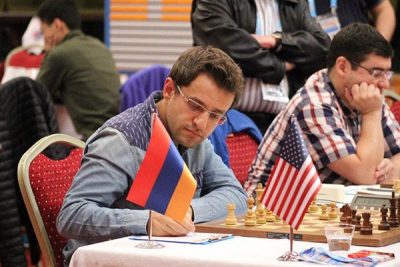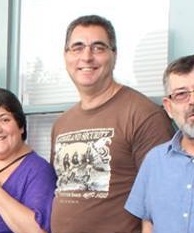By
Rupen Savoulian
Chess is not the top sports news item in English-speaking countries, but it is a huge deal in Armenia.
This geographically small, land-locked country of three million, has had a history of adversity since gaining nominal independence in 1991. A former Soviet republic, in 1992-93, Armenia experienced a catastrophic decline in the economy and living standards, engulfed in an ethno-separatist war with neighbouring Azerbaijan, and residents shivered in the winter of 1992-93 as electricity supplies dwindled during a season where temperatures drop to 30 degrees below zero (Celsius). Government corruption was rife, as the elderly and poor suffered. Turkey blockades the country, the Nagorno-Karabagh conflict remains unresolved, and Armenia has become reliant on the Russian economy for supplies. Armenia suffered heavily, like other post-Soviet states, in the breakdown of trade and the cessation of Soviet investment. Yet, there is one area where Armenia dominates the rest of the world – chess.
While the country’s best known export to the West are the putrid and egomaniacal Kardashians, it is in the sport of chess that Armenia has come to excel. The Armenian government made chess a compulsory subject in schools in 2011, the country having been gripped by chess mania. Armenia’s education minister, Armen Ashotyan, explained that making chess a mandatory subject was not only about producing chess prodigies, but also about instilling creative thinking. He elaborated in an interview with Al Jazeera that chess is part of the overall educational development of school-children:
Chess develops various skills – leadership capacities, decision-making, strategic planning, logical thinking and responsibility,” Ashotyan said. “We are building these traits in our youngsters. The future of the world depends on such creative leaders who have the capacity to make the right decisions, as well as the character to take responsibility for wrong decisions.”
Teams of educational psychologists in Armenia, headed by Ruben Aghuzumstyan, have been studying the benefits of teaching chess to school-children from a young age, including developing personality traits such as comparative analysis, creative thinking, and resilience through difficulties. Interestingly, while the Armenian government reintroduced the capitalist system in 1991, corporate sponsorship of chess players is dwarfed by government support for the development of chess grandmasters. It is the state that systematically supports the chess establishment with financial aid, and so players do not spend time worrying about their next source of support. Indeed, the current president of Armenia, Serzh Sargsyan, is president of the Chess Federation of Armenia.
Armenia, like the other ex-Soviet republics, has a long history of national chess participation. The Soviet state emphasised the importance of chess, and heavily subsidised the promotion of the sport. Chess matches were broadcast on state television, games replicated for the benefit of the audience on a wall-sized chessboard, and commentators would spend hours examining various strategies in great detail. The USSR came to dominate the chess olympiads, and sent strong chess teams to the main Olympics, where they were the overwhelmingly dominant competitor in chess. Christopher Beam explained in an article for Slate magazine in 2009 that:
The Soviets also saw chess as embodying their revolutionary ideals. It was a game of skill, and the USSR prided itself on its intellectual talents. It was cheap, and anyone could play it. And to Soviet leaders, its back-and-forth dynamic reflected the dialectical concept of history espoused by Marxism. (Never mind the irony of playing with imperialist symbols like kings and queens.) The Russians developed a reputation for collective thinking when it came to chess. Soviet competitors were sometimes told to lose on purpose in tournaments in order to clear the way for better players. At the famous match between Bobby Fischer and Boris Spassky in 1972, dozens of Soviet grandmasters would huddle during breaks and debate Spassky’s next move. Fischer, by contrast, brought one assistant.
The Soviet chess school churned out child prodigies every generation – and in the 1960s, Soviet Armenian chess player Tigran Petrosian became the grandmaster and World Chess Champion after defeating his rivals in 1963. His successes spurred interest in chess, and corresponding pride in the Armenian homeland. Anoosh Chakelian, deputy web editor for the New Statesman magazine, wrote an article in 2014 entitled “A checkered history: why Armenia dominates the chess world”, in which she explained that:
When grandmaster Tigran Petrosian, World Chess Champion from 1963-69, took the title for the first time, there were spontaneous celebrations throughout Armenia and he became a national hero.
Chakelian goes on to explain that the interest in chess transcends age groups and generational barriers:
The country’s obsession with chess transcends all age groups. You can see this in a 2009 BBC World Service report titled ‘Armenia: the cleverest nation on earth’, which notes “four generations” turning out to watch its champion Levon Aronian play a match in the Armenian mountains. It describes “young kids aged five, six, seven years old and grizzled old men in sunglasses.
The late great chess grandmaster Tigran Petrosian serves as an inspiration for generations of Armenian schoolchildren until today, and his portrait adorns the chess schools and classrooms in the country. Current Armenian chess champion, Levon Aronian, is a national hero in his country, the ‘David Beckham’ of the chess world. In 2015, the American travel journalism magazine Roads and Kingdoms published an extensive and engaging overview of chess in Armenia, detailing not only the life and achievements of Aronian, but also the systematic way in which chess is approached in that country. The authors of the review explain that:
The country’s president, Serzh Sargsyan, doubles as president of Armenia’s Chess Federation and the sport is a compulsory part of primary education. School children read colorful textbooks whose chess-inspired characters teach advanced game tactics. Television shows such as Chess 64, or, for younger viewers, Chess World, air on state TV, and magazines including Shakhmatayin Hayastan (literally, “Chess in Armenia”) are published on a weekly basis, keeping audiences and readers up to date on recent tournaments, tactics, and, bizarrely, the chess celebrity scene.
Aronian’s celebrity status traces back to the 1963 victory by Tigran Petrosian, and continues this trend of instilling national pride. Public places were named after Petrosian, commemorative stamps were issued in his honour, and books about his chess strategies were produced to pass on the accumulated wisdom, hopefully to be replicated by subsequent generations.
Garry Kasparov, Azerbaijani born of Armenian heritage, is another former chess grandmaster and world champion. Now that Kasparov has come up in this discussion, and Bobby Fischer gained a mention earlier, it is important to establish a crucial observation at this juncture. It is possible to be clever and an idiot at the same time, an idiot savant if you will. The most famous and saddening example of a genius-idiot is (ironically) a former chess grandmaster and world champion, Bobby Fischer. Brilliant at the chess board, Fischer was consumed by conspiratorial paranoid thinking, utterly convinced that powerful, underhanded forces were working against him – firstly it was the Russians, then the Jews, the American government (frequently conflating the latter with the former), espousing vitriolic hatred against what he described as ‘world Jewry’ and its pernicious attempts to silence him.
In a similar way, former grandmaster Garry Kasparov fits the bill – a chess prodigy, who has written books denouncing what he sees are the enemies of freedom around the world. Who are these enemies? The Russian chess establishment, the World Chess Federation (FIDE), Russian president Vladimir Putin, the Soviet secret police, vacillating Western leaders like Bill Clinton and Barack Obama, former German chancellor Gerhard Schroder – his explanation can be found in his latest book. Like Fischer, Kasparov is at pains to denounce anyone (or any organisation) that does not recognise his undisputed genius. Like Fischer, Kasparov’s criticisms are not so much against a political party or system, but against what he sees as a life and career that did not go according to his expectations. He wishes to return to the simplistic certainties of the Cold War, with America the ‘good’ on one side, and Russia the ‘bad’ on the other. There are powerful political and economic forces in the world, and we all have to deal with our place in a system not of our own choosing.
As Armenia remains mired in economic crisis and unresolved ethnic separatist conflict, it is heartening to see that in one area at least, Armenia has made its mark on the map.



No Comments Yet!
You can be first to comment this post!